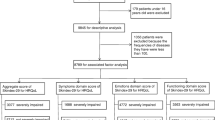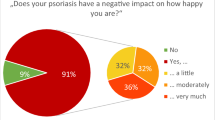Abstract
Background
The Dermatology Quality of Life Index (DLQI) is the most commonly used quality of life questionnaire in dermatology.
Objectives
The aim of this study was to compare the DLQI to measures of well-being and general quality of life in patients with chronic inflammatory skin diseases.
Materials & Methods
A cross-sectional study among patients with psoriasis and atopic dermatitis was conducted at a hospital in Munich, Germany (12/2017–04/2019). Participants filled in validated scales measuring happiness, quality of life, and DLQI.
Results
In 102 patients with chronic inflammatory skin diseases, the DLQI was associated only with physical quality of life and negative emotions, and not psychological quality of life or positive affect. The DLQI alone accounted for 26% of variance in general quality of life. Combining DLQI and happiness accounted for a total of 73% of variance, with both variables contributing to the model.
Conclusion
The DLQI alone only partially reflected well-being. Assessing happiness in addition to the widely used DLQI can contribute to a more comprehensive evaluation of well-being.
Similar content being viewed by others
References
Wood-Dauphinee S. Assessing quality of life in clinical research. J Clin Epidemiol 1999; 52: 355–63.
World Health OrganizationConstitution of the World Health Organization. Geneva: World Health Organization, 1948.
Chernyshov PV. The evolution of quality of life assessment and use in dermatology. Dermatology 2019; 235: 167–74.
Finlay AY, Khan GK. Dermatology life quality index (DLQI) — a simple practical measure for routine clinical use. Clin Exp Dermatol 1994; 19: 210–6.
Lopez SJ, Gallagher MW. A case for positive psychology. In: Lopez SJ, Synder CR, editors. The Oxford Handbook of Positive Psychology (2nd edn). Oxford: Oxford University Press Inc, 2009.
Diener E. Subjective well-being. Psychol Bull 1984; 95: 542–75.
Diener E, Oishi S, Lucas RE. Subjective well-being: the science of happiness and life satisfaction. In: Lopez SJ, Synder CR, editors. The Oxford Handbook of Positive Psychology (2nd ed). Oxford: Oxford University Press, 2009.
Schuster B., Peifer C., Ziehfreund S., Biedermann T., Zink A., Schielein M. Happiness and depression in psoriasis: a cross-sectional study in GermanyQual Life Res 2022; 31: 1761–1773.
Schuster B, Ziehfreund S, Albrecht H, et al. Happiness in dermatology: a holistic evaluation of the mental burden of skin diseases. J Eur Acad Dermatol Venereol 2020; 34: 1331–9.
Birdi G, Cooke R, Knibb RC. Impact of atopic dermatitis on quality of life in adults: a systematic review and meta-analysis. Int J Dermatol 2020; 59: e75–91.
de Korte J, Sprangers MA, Mombers FM, Bos JD. Quality of life in patients with psoriasis: a systematic literature review. J Investig Dermatol Symp Proc 2004; 9: 140–7.
Schielein MC, Tizek L, Schuster B, et al. Always online? Internet addiction and social impairment in psoriasis across Germany. J Clin Med 2020; 9: 1818.
Ring J, Zink A, Arents BWM, et al. Atopic eczema: burden of disease and individual suffering — results from a large EU study in adults. J Eur Acad Dermatol Venereol 2019; 33: 1331–40.
Schielein MC, Tizek L, Schuster B, Ziehfreund S, Biedermann T, Zink A. Genital psoriasis and associated factors of sexual avoidance — A people-centered cross-sectional study in Germany. Acta Derm Venereol 2020; 100: adv00151.
Skevington SM, Lotfy M, O’Connell KA, Group W. The World Health Organization’s WHOQOL-BREF quality of life assessment: psychometric properties and results of the international field trial. A report from the WHOQOL group. Qual Life Res 2004; 13: 299–310.
European Task Force on Atopic Dermatitis. Severity scoring of atopic dermatitis: the SCORAD Index (consensus report of the European Task Force on Atopic Dermatitis). Dermatology 1993; 186: 23–31.
Nast A, Boehncke W-H, Mrowietz U, et al. S3 — Guidelines on the treatment of psoriasis vulgaris update 2011. J Dtsch Dermatol Ges 2011; 9: S1–95.
Wollenberg A, Barbarot S, Bieber T, et al. Consensus-based European guidelines for treatment of atopic eczema (atopic dermatitis) in adults and children: part I. J Eur Acad Dermatol Venereol 2018; 32: 657–82.
Diener E, Wirtz D, Tov W, et al. New measures of well-being: flourishing and positive and negative feelings. Soc Indic Res 2010; 39: 143.
Rahm T, Heise E, Schuldt M. Measuring the frequency of emotions-validation of the scale of positive and negative experience (SPANE) in Germany. PLoS One 2017; 12: e0171288.
Diener E, Emmons RA, Larsen RJ, Griffin S. The satisfaction with life scale. J Pers Assess 1985; 49: 71–5.
Glaesmer H, Grande G, Braehler E, Roth M. The German version of the satisfaction with life scale (SWLS). Eur J Psychol Assess 2011; 27: 127–32.
Angermeyer MC, Kilian R, Matschinger H. WHOQOL-100 und WHOQOL-Bref. Göttingen: Hogrefe-Verlag, 2000.
Medvedev ON, Landhuis CE. Exploring constructs of well-being, happiness and quality of life. Peer J 2018; 6: e4903.
Paudyal P, Apfelbacher C, Jones C, et al. “DLQI seems to be ‘Action’, and Skindex-29 seems to be ‘Emotion’”: qualitative study of the perceptions of patients with psoriasis or eczema on two common dermatology-specific quality of life measures. Acta Derm Venereol 2020; 100: adv00105.
Mattei PL, Corey KC, Kimball AB. Psoriasis area severity index (PASI) and the dermatology life quality index (DLQI): the correlation between disease severity and psychological burden in patients treated with biological therapies. J Eur Acad Dermatol Venereol 2014; 28: 333–7.
Puig L, Thom H, Mollon P, Tian H, Ramakrishna GS. Clear or almost clear skin improves the quality of life in patients with moderate-to-severe psoriasis: a systematic review and meta-analysis. J Eur Acad Dermatol Venereol 2017; 31: 213–20.
Golbari NM, van der Walt JM, Blauvelt A, Ryan C, van de Kerkhof P, Kimball AB. Psoriasis severity: commonly used clinical thresholds may not adequately convey patient impact. J Eur Acad Dermatol Venereol 2021; 35: 417–21.
Steptoe A, Dockray S, Wardle J. Positive affect and psychobiological processes relevant to health. J Pers 2009; 77: 1747–76.
Diener E, Pressman SD, Hunter J, Delgadillo-Chase D. If, why, and when subjective well-being influences health, and future needed research. Appl Psychol Health Well Being 2017; 9: 133–67.
Broadbent E, Koschwanez HE. The psychology of wound healing. Curr Opin Psychiatry 2012; 25: 135–40.
Basra MK, Fenech R, Gatt RM, Salek MS, Finlay AY. The dermatology life quality index 1994–2007: a comprehensive review of validation data and clinical results. Br J Dermatol 2008; 159: 997–1035.
Badia X, Mascaro JM, Lozano R. Measuring health-related quality of life in patients with mild to moderate eczema and psoriasis: clinical validity, reliability and sensitivity to change of the DLQI. The Cavide Research Group. Br J Dermatol 1999; 141: 698–702.
Shikiar R, Willian MK, Okun MM, Thompson CS, Revicki DA. The validity and responsiveness of three quality of life measures in the assessment of psoriasis patients: results of a phase II study. Health Qual Life Outcomes 2006; 4: 71.
Veenhoven R. Notions of the “Good Life”. In: David SA, Boniwell I, Conley Ayers A, editors. The Oxford handbook of happiness. Oxford: Oxford University Press, 2013.
Acknowledgements
We thank Alphina Kain for editing and reviewing this manuscript for English language.
Author information
Authors and Affiliations
Corresponding author
Additional information
Financial support
none.
Conflicts of interest
the authors declare no conflicts of interest.
IRB approval status
this study was reviewed and approved by the local ethics committee of the Technical University of Munich (reference number 424/17S).
Supplementary data
40699_2022_4244_MOESM1_ESM.pdf
Adding happiness to complement the Dermatology Quality of Life Index in psoriasis and atopic dermatitis healthcare: a cross-sectional study
About this article
Cite this article
Schuster, B., Ziehfreund, S., Schielein, M.C. et al. Adding happiness to complement the Dermatology Quality of Life Index in psoriasis and atopic dermatitis healthcare: a cross-sectional study. Eur J Dermatol 32, 220–226 (2022). https://doi.org/10.1684/ejd.2022.4244
Accepted:
Published:
Issue Date:
DOI: https://doi.org/10.1684/ejd.2022.4244




